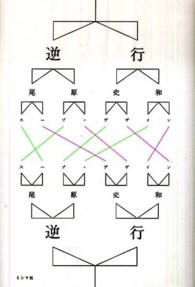- ホーム
- > 洋書
- > 英文書
- > History / World
Full Description
'A stunning global history of West Africa ... with this new tour de force, Green confirms himself as the most innovative historian, writer, and thinker of his generation' Ana Lucia Araujo, author of Humans in Shackles: An Atlantic History of Slavery
A unique, startling book that gives a rich and detailed sense of life in an African port some 360 years ago
In 1665 Crispina Peres, the most powerful trader in the West African slave trafficking port of Cacheu, was arrested by the Inquisition. Her enemies had conspired to denounce her for taking treatments prescribed by Senegambian healers: the djabakós. But who was Peres? And why was the Portuguese Inquisition so concerned with policing the faith of a West African woman in today's Guinea-Bissau?
In Cacheu Toby Green takes us to the heart of this conundrum, but also into the atmosphere of a very distant time and place. We learn how people in seventeenth-century Cacheu built their houses, what they wore, how they worshipped - and also the work they did, how they had fun, and how they healed themselves from illness.
Through this story, the haunting realities of the growing slave trade and the rise of European empires emerge in shocking detail. By the 1650s, the relationship between Europe, West Africa, and the Americas was already an old one, with slaving entrepots, colonies, and military bases interweaving over many generations. But Cacheu also challenged the dynamic. It was globally connected to places ranging from China and India to Brazil and Colombia, and women like Crispina Peres ran the town and challenged the patriarchy of empire.
For the first time, through the surviving documents recording Peres's case, we can see what this world was really like. Cacheu is an extraordinary act of historical recovery. It is the story of a seventeenth-century West African woman, but also of the shifting, sophisticated world in which she lived - its beliefs, values and people.








